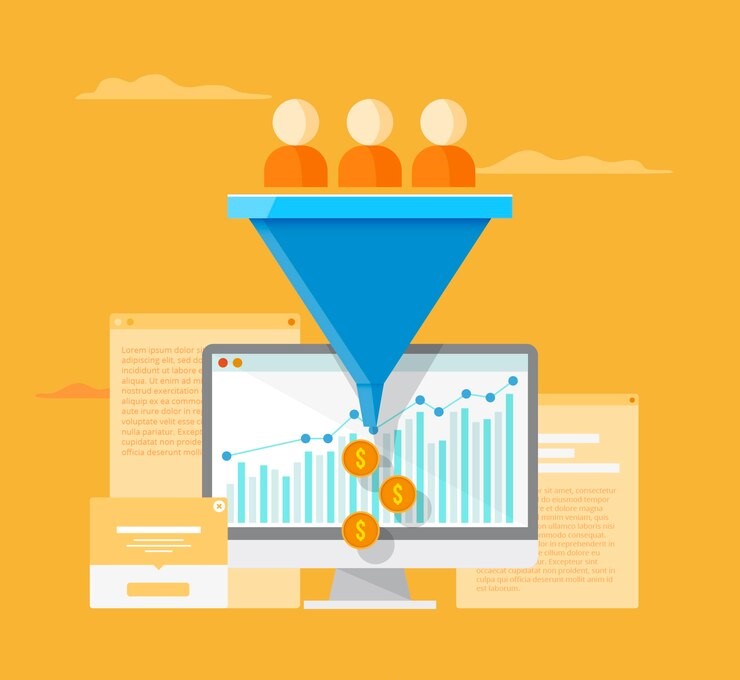A sales funnel is a critical concept in marketing and sales strategy, representing the journey that potential customers take from initial awareness to making a purchase. In this comprehensive article, we’ll delve into the definition of a sales funnel, explore its stages, discuss its significance in the sales process, and provide insights into optimizing and leveraging sales funnels for business growth.

Defining the Sales Funnel
What is a Sales Funnel?
A sales funnel, also known as a purchase funnel or revenue funnel, is a visual representation of the customer journey from the point of initial awareness to the completion of a purchase. It illustrates the various stages that potential customers pass through as they move closer to making a buying decision.
Components of a Sales Funnel:
A typical sales funnel comprises several stages, each representing a different phase of the customer’s journey:
- Awareness Stage: At the top of the funnel, potential customers become aware of a product, service, or brand through marketing efforts such as advertising, content marketing, or social media engagement.
- Interest Stage: In this stage, prospects show interest in the product or service and actively seek more information. They may visit the company’s website, read blog posts, or sign up for email newsletters.
- Consideration Stage: Potential customers evaluate the product or service and compare it with alternatives. They may research features, benefits, pricing, and reviews to assess its suitability for their needs.
- Intent Stage: At this stage, prospects demonstrate a strong intention to purchase and may engage in actions such as adding items to a shopping cart, requesting a quote, or initiating contact with a sales representative.
- Decision Stage: The final stage of the funnel involves making a purchase decision. The prospect becomes a customer by completing the transaction and making a purchase.
Importance of the Sales Funnel
1. Visualizing the Customer Journey:
The sales funnel provides a clear visualization of the customer’s progression through various stages of the buying process. It helps businesses understand customer behavior, identify potential bottlenecks, and optimize marketing and sales efforts accordingly.
2. Lead Generation and Nurturing:
By guiding prospects through the sales funnel, businesses can generate leads, nurture relationships, and build trust with potential customers over time. Effective lead nurturing strategies help keep prospects engaged and move them closer to making a purchase.
3. Improving Conversion Rates:
Understanding the sales funnel allows businesses to identify opportunities for improving conversion rates at each stage. By addressing customer needs, providing relevant information, and removing barriers to purchase, businesses can increase the likelihood of converting prospects into customers.
4. Targeted Marketing and Personalization:
The sales funnel enables businesses to tailor marketing messages and campaigns to specific stages of the customer journey. By delivering targeted content and offers based on where prospects are in the funnel, businesses can increase engagement and drive conversions.
Optimizing the Sales Funnel
1. Content Marketing:
Create valuable content that educates and engages prospects at each stage of the funnel. Use blog posts, whitepapers, case studies, and videos to address customer pain points, answer questions, and showcase the benefits of your product or service.
2. Lead Magnets and Offers:
Offer lead magnets such as ebooks, guides, or free trials to attract prospects and encourage them to provide their contact information. Use compelling offers and incentives to incentivize prospects to move through the funnel and take the desired action.
3. Email Marketing:
Implement targeted email marketing campaigns to nurture leads and keep them engaged throughout the sales funnel. Segment your email list based on customer interests, behavior, and stage in the funnel to deliver personalized content and offers.
4. Sales Automation and CRM:
Use sales automation tools and customer relationship management (CRM) software to streamline lead management, track interactions, and automate follow-up processes. By effectively managing leads and staying organized, businesses can maximize efficiency and conversion rates.
Conclusion
A sales funnel is a fundamental concept in marketing and sales strategy, providing a roadmap for guiding potential customers through the buying process. By understanding the stages of the sales funnel and optimizing each stage to meet customer needs, businesses can attract, engage, and convert prospects into loyal customers. With targeted marketing, personalized communication, and strategic optimization, businesses can leverage sales funnels to drive growth, increase revenue, and achieve long-term success in today’s competitive marketplace.
Also read: How to Do Taxes for Small Business: A Comprehensive Guide